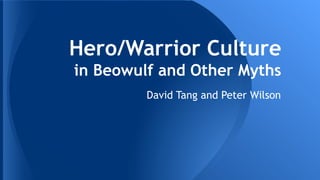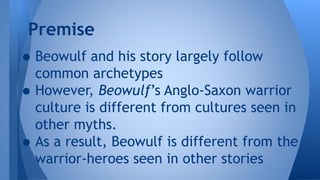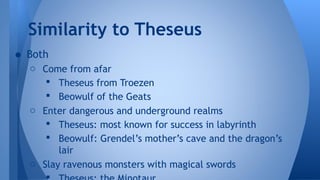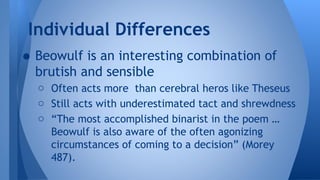Beowulf project other genre
- 1. Hero/Warrior Culture in Beowulf and Other Myths David Tang and Peter Wilson
- 2. ¡°Beowulf ... clearly belong[s] to a subset of the overall Indo-European sword-hero complex. Moreover, [he] also share[s] at least some elements in common with figures belonging to other subsets of that complex.¡± - C. Scott Littleton
- 3. Premise ? Beowulf and his story largely follow common archetypes ? However, Beowulf¡¯s Anglo-Saxon warrior ? culture is different from cultures seen in other myths. As a result, Beowulf is different from the warrior-heroes seen in other stories
- 4. Cultural Differences ? In many ways, Beowulf, along with the Anglo-saxon expectations of him, epitomizes the familiar hyper-masculine, brazen hero o Strength and ability in battle o Importance of boasting o Binarism ¡°(I will do x or die)¡± (Morey 487).
- 5. Cultural Differences After all, isn¡¯t this what you think of when you picture Beowulf?
- 6. Cultural Differences ? However, Beowulf¡¯s role in the community seems to be more complex o Acts as ¡°peace-weaver¡± through his actions to promote good relationship between tribes (Morey 486) ? ? ¡°[F]ulfills his society¡¯s idealized feminine role¡± (Morey 486). Role as king includes great generosity, satisfying
- 7. Individual Differences ? Beowulf is, in many ways, a traditional ¡°sword hero¡± of mythology o ¡°Beowulf [is] not only [a] refle[x] of a common IndoEuropean sword-hero tradition, but also of a subset of that tradition that tells of a hero's descent to a netherworld to slay a non-draconic monster and/or its mother, one or both of whom are threatening the survival of the hero's community¡± (Littleton 6).
- 8. Similarity to Theseus ? Both o Come from afar ? Theseus from Troezen ? Beowulf of the Geats o Enter dangerous and underground realms ? Theseus: most known for success in labyrinth ? Beowulf: Grendel¡¯s mother¡¯s cave and the dragon¡¯s lair o Slay ravenous monsters with magical swords
- 9. Individual Differences ? Beowulf is an interesting combination of brutish and sensible o Often acts more than cerebral heros like Theseus o Still acts with underestimated tact and shrewdness o ¡°The most accomplished binarist in the poem ¡ Beowulf is also aware of the often agonizing circumstances of coming to a decision¡± (Morey 487).
- 10. Sources Morey, Robert. ¡°Beowulf¡¯s Androgynous Heroism.¡± The Journal of English and Germanic Philology 95:4 (Oct. 1996): 486-96. JSTOR. Database. 10 Oct. 2013. Littleton, Scott. ¡°Theseus as an Indo-European Sword Hero, with an Excursus on Some Parallels between the Athenian Monster-Slayer and Beowulf.¡± The Heroic Age1.11 (May 2008): Web. 10 Oct. 2013. <http://www.mun.ca/mst/heroicage/issues/11/littleton.php>


![¡°Beowulf ... clearly belong[s] to a subset
of the overall Indo-European sword-hero
complex. Moreover, [he] also share[s] at
least some elements in common with
figures belonging to other subsets of that
complex.¡±
- C. Scott Littleton](https://image.slidesharecdn.com/beowulfprojectothergenre-131015075538-phpapp01/85/Beowulf-project-other-genre-2-320.jpg)



![Cultural Differences
? However, Beowulf¡¯s role in the
community seems to be more complex
o Acts as ¡°peace-weaver¡± through his actions
to promote good relationship between
tribes (Morey 486)
?
?
¡°[F]ulfills his society¡¯s idealized feminine role¡±
(Morey 486).
Role as king includes great generosity, satisfying](https://image.slidesharecdn.com/beowulfprojectothergenre-131015075538-phpapp01/85/Beowulf-project-other-genre-6-320.jpg)
![Individual Differences
? Beowulf is, in many ways, a traditional
¡°sword hero¡± of mythology
o
¡°Beowulf [is] not only [a] refle[x] of a common IndoEuropean sword-hero tradition, but also of a subset of
that tradition that tells of a hero's descent to a
netherworld to slay a non-draconic monster and/or its
mother, one or both of whom are threatening the
survival of the hero's community¡± (Littleton 6).](https://image.slidesharecdn.com/beowulfprojectothergenre-131015075538-phpapp01/85/Beowulf-project-other-genre-7-320.jpg)


